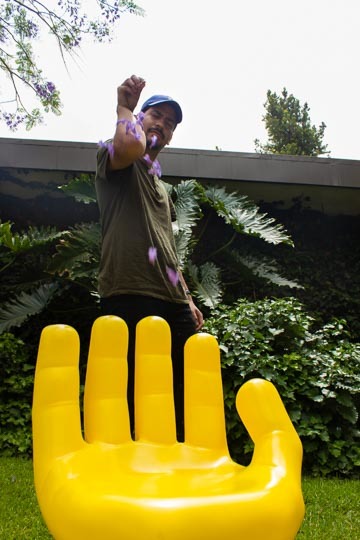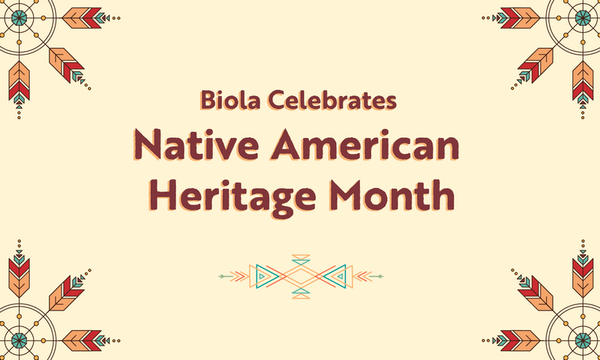“Being from the midwest, the culture is entirely different… it even transcends into how we communicate with each other.”
Josh came to Biola from Cleveland, Ohio and is the first in his family to go to college. He comes from a big family, ten siblings, and a different background than what one might expect from a Biola student. Plus, he came from a culture that differs greatly from Southern California.
But to understand these differences and how Josh plans to use them to his advantage, you have to understand where he came from and where he’s at now.
Ohio
Growing up in a family of ten was exciting but not without its challenges. For one, his family was not the most well off. He says his mom’s goal was to just have her children get through high school. Not only that, but he jokes that “middle child syndrome is actually a thing.” It's easy to become forgotten about in the hustle and bustle of life.
More than that though, the system of getting into college doesn’t really work in a first generation student’s favor. For many, going to college is a process that family or close friends have been through, and know how to navigate.
“Everyone knows the ‘secret’ if they’re second or third gen” he says.
He didn’t know so many things, and had no one with experience to tell him. He didn’t know where to find scholarships, or what most scholarships even did. He had to learn to fill out his FAFSA, his parents couldn’t do it for him. Plus, he was not informed about college deadlines. This resulted in him taking extra time for college.
“I could have been done in two years, I had to wait a whole year just to apply for college” he says.
He even did a college in high school program before applying for colleges, but the college prep resources were still non-existent or vague. No one was giving him clear directives on how to get to a university.
“I was missing out on something that everyone just seemed to know about.”
Biola
Coming to Biola was also a challenge both academically and culturally. He is part of the FirstGen Scholars program at Biola, which has helped him understand the shame that can come with being a first generation college student.
“I felt really bad about being firstgen,” he says.
Within his family going to college was an amazing thing, but to the rest of the world it seemed like a norm he couldn’t reach. He always felt embarrassed. Everyone else was getting through college just fine, yet he was struggling. The first gen program changed his perspective on everything.
“We are to celebrate being firstgen because it is a huge accomplishment,” he says. He began viewing it as less of a regrettable setback, and more of a giant step forward.
But getting to college was not the only accomplishment, Josh also made strides as he transitioned into college life.
He talks about the rigor of four-year university classes compared to community college classes (which he attended for a couple of years prior to Biola). He remembers writing his first SIM paper, a project heavy in the analysis of scripture. It was overwhelming for him as a science major because he already had so much work.
He had to learn to plan out his time while also taking full responsibility for not being able to turn things in on time. Classes like First Year Seminar taught him to keep a planner, which was helpful to his scattered brain.
“I would never write anything down,” he says.
To help with academic struggles he was paired with a firstgen mentor, another firstgen student who had already gone through the program. His relationship with his mentor was not without its challenges too.
Josh noticed little cultural differences, like the words “hecka” or “hella.” He had never heard those before. There were also clearer differences, like his blunt style of communication, which he did not share with his mentor. This made talking through the process of going to college a bit difficult. Things would get lost in translation between his mentor as well as his peers.
“Living on campus is really, really different,” he says. “It's an entirely new wave of social interactions.”
Having to deal with differences on a day-to-day basis while adjusting to bigger class loads and so many first time experiences can become stressful.
However, programs that he has gone through have especially helped him to adjust to college life well. They have taught him to communicate effectively with people who don’t communicate in the same way. That goes for mentors, teachers, and peers.

A Different Perspective
Experiencing these setbacks gave Josh a unique perspective not only on the college experience, but for his future aspirations. In the short-term, he wants to go into a masters program for a physician's assistant practice. Medicine and healthcare are a main focus of his future as a Human Biology major.
“It’s a good short-term goal,” he says. “Ask any young practicing medical professional; they want that hands-on experience.”
In the long-term, Josh wants to get his doctorate in health administration to write hospital policy and health plans to benefit communities that are less fortunate and with less access to quality healthcare. He knows of many hospitals that provide free, but low quality services.
Josh immediately recognizes that people with less resources often don’t know what to do with what they’ve been given.
“The epidemics we see in low income communities… it’s a lack of health education.”
Josh can empathize with this lack of education. If no one had put systems in place to help him get into and thrive in college, he likely wouldn’t have gone. His heart is to educate and change the trajectory of low income communities through quality healthcare, much like his trajectory was changed.
Josh brings a perspective to the table that is valuable, unique, and needed, though he might never have been given a chance to thrive were it not for those involved with the firstgen program and everyone else who helped him along the way. These were people who understood the challenges he faced and worked to help him overcome them.
Steps Toward Success
Wondering how to succeed in light of unique challenges? Before you make a move, take some time to frame your situation using these steps.
Reflect: Examine the challenges you are facing. Make a list of them. Pinpoint where they show up in your life and when. Are there ways you wish you could succeed academically or personally that seem to come naturally to others? What are those ways?
Repeat: Once you’ve identified where you think you’re being held back, go to someone you trust and talk to them about what you’ve identified. Let them give you feedback about how you’re feeling. Ask if they also see evidence of these things in your life.
Reach: Finally, reach out to others. Places like Student Success are here to help with academic troubles and can direct you to other helpful departments on campus. Or talk with your faculty advisor once you’ve identified some roadblocks to your success.
Do you have a compelling story or experience as a student that you’d like to share? Feel free to email us at studentsuccess.newsletter@biola.edu
 Biola University
Biola University



.jpg)